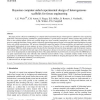Free Online Productivity Tools
i2Speak
i2Symbol
i2OCR
iTex2Img
iWeb2Print
iWeb2Shot
i2Type
iPdf2Split
iPdf2Merge
i2Bopomofo
i2Arabic
i2Style
i2Image
i2PDF
iLatex2Rtf
Sci2ools
127
click to vote
CAD
2005
Springer
2005
Springer
Bayesian computer-aided experimental design of heterogeneous scaffolds for tissue engineering
This paper presents a Bayesian methodology for computer-aided experimental design of heterogeneous scaffolds for tissue engineering applications. These heterogeneous scaffolds have spatial distributions of growth factors designed to induce and direct the growth of new tissue as the scaffolds degrade. While early scaffold designs have been essentially homogenous, new solid freeform fabrication (SFF) processes enable the fabrication of more complex, biologically inspired heterogeneous designs with controlled spatial distributions of growth factors and scaffold microstructures. SFF processes dramatically expand the number of design possibilities and significantly increase the experimental burden placed on tissue engineers in terms of time and cost. Therefore, we use a multi-stage Bayesian surrogate modeling methodology (MBSM) to build surrogate models that describe the relationship between the design parameters and the therapeutic response. This methodology is well suited for the early s...
| Added | 15 Dec 2010 |
| Updated | 15 Dec 2010 |
| Type | Journal |
| Year | 2005 |
| Where | CAD |
| Authors | Lee E. Weiss, Cristina H. Amon, Susan Finger, Eric D. Miller, D. Romero, I. Verdinelli, L. M. Walker, Phil G. Campbell |
Comments (0)

